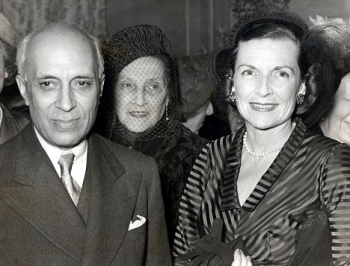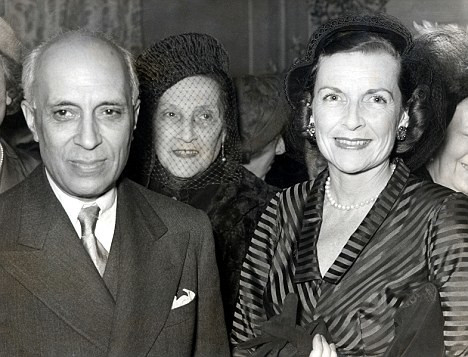
 A. J. Philip
A. J. Philip

In ordinary circumstances, Jawaharlal Nehru should have been the toast of the ‘Har Ghar Tiranga’ campaign that concluded on Independence Day. There are many reasons for the same. Nehru was the one who introduced the national flag to the members of the Constituent Assembly on July 22, 1947. He displayed on the occasion two identical flags, one made of khadi silk and the other of khadi cotton. From that day, the Tricolour became the national flag.
Yet, a full-page advertisement released on the occasion of the 75th anniversary of Independence by the Karnataka government did not display the picture of Nehru. Among the many freedom fighters, whose pictures appeared on the page, there was not one Muslim. Surprisingly, the picture of a person who advocated Partition for the first time on the ground that Muslims and Hindus were separate nations, was published prominently.
It was this gentleman who wrote several clemency letters to the British rulers, while he was incarcerated in the cellular jails in Andamans. In his letters, he promised the British that he would be a loyal citizen and would never create any problems for them. His letters had an effect on the alien rulers who released him from the jail. He remained a good boy. He providentially escaped being hauled up for the assassination of Mahatma Gandhi.
During the freedom struggle, Nehru remained in jail for nearly 12 years. He used this time productively by writing three books namely The Discovery of India, Glimpses of World History and his Autobiography. He did not have the benefit of a secretary or a well-stocked library while writing these books.
As Prime Minister, he wrote long letters to the chief ministers discussing many aspects of governance. These letters are a pointer to the challenges the nation faced in its formative period.
In contrast, we have a leader who could have gone to jail protesting against the Emergency. Instead, he preferred to go to the US where he remained till the Emergency was lifted and election was announced in 1977. It is this gentleman who claims that it was he who first introduced development to the country in 2014. He is known for his great oratorical skills but when the teleprompter conked out at Davos, he just had to abandon his speech.
He and his drum-beaters have been portraying Nehru as a good-for-nothing person who caused more damage than good to the nation. They can't tolerate Nehru because they know that he was an incorrigible secularist who saw man as man, not as Hindu or Muslim or Christian. While being an agnostic, he celebrated life. His Will and Testament is proof of his abiding faith in the ethos of the nation.
Nehru was modern while being traditional. As the present-day rulers are making efforts to obliterate his name from textbooks, I picked up a new book at the Jaipur Literature Festival because I knew that it would discuss a subject of great interest for the Indian readers. I was not disappointed.
I decided to buy the book after attending a session where the author Andrew Lownie had a conversation with Narayani Basu, who is the great grand-daughter of V.P. Menon. She also wrote an authoritative biography of Menon, who was instrumental in uniting more than 500 native states into what is today known as the Indian union. The subject of their discussion was the Mountbattens.
Nothing surprising at all as the title of the book is “The Mountbattens: Their Lives and Loves”. When a friend noticed the title of the book, she was a little surprised for the word Love was used in plural. Alas, she was blissfully ignorant of the two persons, who made a profound impact on our nation in their own peculiar ways.
There are so many books on the Mountbattens. There are also authorised versions of their biographies. Many decades have passed since both of them passed away. The question, therefore, arises: why a new book on them? Anyone who has read Andrew Lownie’s book will vouchsafe the fact that it is indeed a page turner. The author has done considerable research into the lives of these two persons to arrive at a portrayal which is at once authentic and readable.
The author quotes Lord Mountbatten to say that “no biography has any value unless it is written with warts and all”. It is not an easy job to write about Mountbatten who considered himself as the “naval officer who became First Sea Lord after being Supreme Allied Commander and Viceroy of India and thus the best known figure the Navy has produced since Nelson, as well as being the President of the society of genealogists”.
Pomposity was not just an art but a fact of life for Dickie as he was widely known among his friends and contemporaries. He was well connected, especially with the royal family and he used the connections to the hilt in his career as a navy man. Though he considered himself no less than Nelson, the author highlights many aspects of his career to suggest that he was at best a mediocre naval commander. Left to himself, he would have been a disaster for the British Navy.
However, he had one great quality. He believed in teamwork and he was good at building a team, however large and expensive it might have been.
Many people would not know that Dickie Mountbatten and Edwina took their decision to be man and wife at the Viceroy’s House in New Delhi, known as the Rashtrapati Bhawan today. It was there that he proposed to her which she readily accepted. From there, they went all the way to Humayun Tomb to see the marvelous structure on that full moon night. Was their marriage destined to be as dead as Humayun?
The author quotes chapter and verse to suggest that Mountbatten managed to get all the posts he held using his political and royal connections. Edwina was one of the richest persons in Britain at that time. Their marriage saw the coming together of royalty and richness that was to last their whole lives.
Theirs was an unconventional marriage in the sense that both of them sought and obtained love in other persons, not necessarily younger and brighter. Of course, they had babies but that too did not prevent Edwina from having her own ways when it came to fulfilling her ambitions of love. Between the two, Dickie was a better parent than Edwina and they remained so all their lives.
Despite having so many lovers of their own, they did not consider divorce as an option. This may be because each realised that his or her partner was truly worth keeping in view of the social status it brought to them, individually and jointly. The author hints at the possibility that Dickie was a gay given his close association with many young naval cadets. Other than quoting some who saw some strange goings-on in his cabin, he does not provide any conclusive evidence. Even a biographer has his own limitations!
Edwina had a fascination for the black and the young, more so when they are otherwise talented. Lesbian relationships could also not be ruled out. There were long periods when she was on her own and he was on his own. Nonetheless, they ensured that their relationship did not reach a breaking point.
For Mountbatten nothing mattered more than heading the British Navy. However, nobody can dispute the fact he played the greatest role in his life as the Viceroy of India. The book makes it very clear that it was Mountbatten’s gutsy decision to advance the date of Independence to August 15, 1947, instead of a date in 1948. He knew that his assignment in India was to grant independence to India, not to rule the country forever. Being a military man, he wanted a target date and that is how he finalised a date to declare independence.
It seems even the Labour government in Britain was taken aback by Mountbatten's decision. He had just hundred days to finalise the partition which had by then become a foregone conclusion. The whole country had to be divided on the basis of religion. He knew that if the deliberations were carried on interminably, there would have been civil war between Hindus and Muslims and there would have been nothing to hand over to the Nehrus and the Jinnahs.
Everything had to be done quickly and in time-bound manner. The services of a cartographer were hired to divide the country. That Cyril John Radcliffe had no connection with India, that he never even visited the country were considered as his strong points. As he set about doing his job, Mountbatten realised that it could indeed be an unpleasant task that would pit the two communities against each other.
The Viceroy wisely decided not to reveal the details of the vivisection plan until Pakistan and India had their first Independence Day in 1947. In fact, only after India and Pakistan came into being did the people know that Lahore was to remain in Pakistan and Amritsar in India. They also knew that the Chittagong Hill tracts would remain a part of East Pakistan.
It was a shock for Jinnah that his demand for Andamans to link East and West Pakistan was not considered. Nor was his demand for a corridor between the two wings of his state accepted. It shocked him that India was given a link through Punjab to the state of Kashmir.
The book suggests that Mountbatten was favourably inclined towards India, rather than Pakistan. There was never any bonhomie between Muhammad Ali Jinnah and the Viceroy. On the other hand, he found in Nehru a good friend, a diplomat and statesman he could look up to. Nehru had his British education and he could speak and write better English than Mountbatten himself. By then, Nehru, who was a widower, had struck up a good relationship with Edwina.
She found in Nehru a handsome man, blessed with the gift of the gab. In any case, he was the darling of the Indian masses. Small wonder that she found in him the darling of her heart. Historians have always wondered what kind of relationship Nehru and Edwina had. Was it platonic, as some would suggest? Did they have a sexual relationship that lasted many years? The author is unable to give a definite answer.
Journalist M.J. Akbar in his biography of Jawaharlal Nehru quotes Russi Modi of Tata Steel to say that he found the two in a lip-lock.
Did the lip-lock graduate to a closer relationship and end in the consummation of their love? On this question, the book is pregnant with silence. It is unfair to blame the author when he provides many quotations which can help the reader to reach his own conclusion. What is clear is that they had a beautiful relationship nurtured over many years through letters and exchange of gifts. Nehru used to meet her whenever he visited London.
Just before her death, Edwina left a large collection of letters she exchanged with Nehru with her husband. The author quotes Nehru’s sister Vijaylakshmi Pandit as saying that her brother was an impotent. Whatever be the truth, the fact is that Nehru’s friendship with Edwina and her husband could help tilt the balance in India’s favour when a tehsil in Punjab mattered a lot to the contending countries.
One day when the letters are published, they will throw greater light on their relationship. Indira Gandhi had an aversion for Edwina, mainly because of her affair with her father. It may appear curious that Edwina wanted a burial in the sea, whereas Mountbatten had a burial in a cemetery. They both lived their lives, according to their own set rules. That is why their lives remain interesting and books like the one under review are written and read.
ajphilip@gmail.com